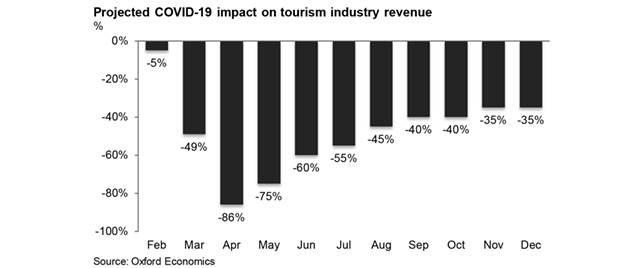A leading travel industry association is predicting that the United States' travel industry will lose more than half a trillion dollars in revenue this year, due to the global economic shutdown.
The report from US Travel and Oxford Economics models the rest of the year and predicts an 81 percent drop in revenue over the next two months, with a loss of 45 percent of previously expected revenue for the year. In total, that's an estimated $519 billion decline in projected revenue for 2020, according to the report.

Of that loss, more than 10 percent — $54 billion — comes from the Recreation & Amusement industry, the report suggests. To put that into perspective, the entire Disney Resorts, Experiences and Consumer Products segment reported $26.2 billion in revenue last year. The report estimates a loss of 1.1 million jobs in the Recreation & Amusement segment, contributing to the loss of more than 6.85 million jobs across the U.S. travel industry.
Helping to drive those losses, the report estimates that 43 million fewer travelers will visit the United States from abroad in 2020 — a 54 percent drop over expectations. And that assumes a reopening of international borders in the second half of the year. The biggest decline will come from Europe, which will see a 68 percent decline in travel to the US, the report estimates. The overall decline in international visitors will result in an estimated loss of $116 billion in travel spending.
The report also suggests that the country can mitigate the losses by "'flattening the curve' of the economic downturn" by "opening of travel businesses on a region-by-region basis, enhanced traveler safety measures, and a robust array of marketing campaigns to encourage travel among low risk US residents."
It's interesting that the association uses the vocabulary of epidemiologists who have urged social distancing as a way to flatten the curve of expected infections and deaths caused by Covid-19. Those efforts have helped reduce the number of Americans who have died as a result of the virus, though the toll currently stands at more than 50,000 deaths.
Despite what the report suggests, there are no "low risk US residents" when it comes to Covid-19, as the disease is caused by a new virus for which no one had immunity. And the virus does kill younger and otherwise healthy people, even if does so at a lower rate than the elderly and those with preexisting respiratory issues. But a "lower" risk should not immediately imply a "low" risk.
(This isn't my metaphor, but I will steal it. Imagine I offer you a bowl of 100 candies of the same shape, color, and size and tell you that one contains poison that will kill you instantly. It's just a one in a 100 chance, so that's "low risk," right? I suspect that none of you will take that chance and eat any of the candy.)
Without a vaccine, the only ways to open travel businesses without spiking the nation's death toll would be for them to change their operations to support social distancing... or for the federal, state, and local governments to implement an extensive program of testing and contact tracing that could allow for a more limited and sharply focused implementation of social distancing and quarantine.
Unfortunately, states such as California that are trying to do just that continue to report difficulty in obtaining access to tests, including an accurate and reliable antibody test that could tell us who has had the disease and might be safe to work and travel without restriction. The longer we delay the production and distribution of proper testing, the longer we will have to remain with highly restrictive social distancing rules.
And the longer that the travel industry, including theme parks, will remain under duress.
TweetThis article has been archived and is no longer accepting comments.